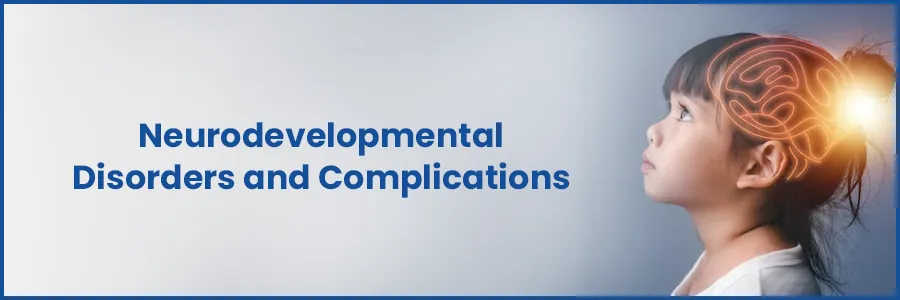- Cardiology 84
- Dermatology 45
- Endocrinology 33
- ENT 16
- Fertility 190
- Gastroenterology 78
- General-Medicine 81
- Gynecology 80
- Hematology 19
- Infectious-Diseases 33
- Neurology 52
- Oncology 34
- Ophthalmology 23
- Orthopedics 69
- Pediatrics 31
- Procedure 23
- Public-Health 144
- Pulmonology 59
- Radiology 8
- Urology 68
- Wellness 161
- Woman-and-child 77

Neurodevelopmental Disorders and Complications in Child
The journey through a child's neurological development is a fascinating and intricate one, marked by numerous milestones and complexities. However, it's essential to acknowledge that some children encounter neurodevelopmental challenges that can impact their growth and potential.
As concerned parents, caregivers, and educators, gaining insight into the causes of neurodevelopmental issues empowers us to take proactive measures.
List Of Neurodevelopmental Disorders That Children Might Experience
- Autism Spectrum Disorder (ASD): ASD is a condition characterized by difficulties in social interaction, communication, and repetitive behaviours.
- Attention-Deficit/Hyperactivity Disorder (ADHD): ADHD is marked by hyperactivity, impulsivity, and difficulty sustaining attention, which can affect academic performance and social interactions.
- Intellectual Disability: It is previously known as mental retardation, this involves limitations in intellectual functioning and adaptive behaviours.
- Specific Learning Disabilities (SLD): These can affect reading, writing, or mathematics skills and might impact academic progress.
- Communication Disorders: These encompass difficulties in speech and language development, including stuttering speech sound disorders, and language processing issues.
- Motor Coordination Disorders (Developmental Coordination Disorder): Challenges with fine and gross motor skills that can affect tasks like writing, tying shoelaces, and playing sports.
- Tourette Syndrome: Characterized by repetitive and involuntary movements or vocalizations known as tics.
- Intellectual Giftedness: While not a disorder, exceptional intellectual abilities can sometimes come with social and emotional challenges if not properly supported.
- Cerebral Palsy: Cerebral Palsy a group of mobility and postural abnormalities caused by injury to the developing brain.
- Down Syndrome: A genetic disorder causing intellectual and developmental delays, often accompanied by distinct physical features.
- Fetal Alcohol Spectrum Disorders (FASDs): Result from maternal alcohol consumption during pregnancy and can lead to a range of physical, cognitive, and behavioural issues.
- Rett Syndrome: A rare genetic disorder affecting primarily females, causing severe cognitive and physical impairments.
- Selective Mutism: A condition where children consistently do not speak in certain social situations despite speaking comfortably in other contexts.
Neuro Developmental Complications
If neurodevelopmental disorders are left untreated, they can lead to various complications that may affect a child's overall well-being and prospects:
- Academic Struggles: Many neurodevelopmental issues can impede learning and academic progress, potentially leading to frustration, low self-esteem, and reduced opportunities for success.
- Social Isolation: Difficulties in social interactions can isolate children from their peers, leading to feelings of loneliness and impacting their emotional development.
- Behavioural Challenges: Untreated issues can manifest as challenging behaviours, making it harder for children to adhere to social norms and interact positively with others.
- Emotional Distress: Struggles with communication, understanding emotions, and managing frustrations can lead to increased emotional distress and mental health concerns.
- Poor Self-Esteem: Continuous struggles in various areas can contribute to a negative self-perception and hinder the development of healthy self-esteem.
- Long-Term Impact: Some neurodevelopmental issues, if not addressed early, can have lasting effects on adulthood, potentially limiting a person's independence and opportunities.
- Family Stress: Families of children with untreated neurodevelopmental issues may experience increased stress as they navigate challenges in understanding and
- supporting their child's needs.
- Missed Opportunities: Without proper intervention, children might miss out on critical developmental windows that are crucial for acquiring essential skills.
Ready to take control of your health journey? Book your appointment now and start your path towards wellness today!
Book an AppointmentFrequently Asked Questions
Neurological illnesses are conditions that impact the neurological system, involving the brain, spinal cord, and peripheral nerves. They can lead to various symptoms and complications that impact a person's motor, sensory, and cognitive functions.
Yes, some neurological problems are inherited, which means they can be handed down via generations. Examples include Huntington's disease and certain types of muscular dystrophy.
Many neurological disorders can be managed and treated, although the extent of treatment success can vary. Some conditions can be controlled with medication, therapy, or lifestyle changes, while others might require surgical intervention.
Yes, some neurological illnesses can cause mental health problems like sadness, anxiety, and cognitive deficits. Alzheimer's disease, for example, is known to have an impact on both cognitive and emotional elements.
Diagnosis often involves a combination of medical history assessment, physical examination, neurological tests, imaging (MRI, CT scans), and sometimes laboratory tests to rule out other potential causes.
Yes, certain neurological disorders and conditions, such as spinal cord injuries or advanced stages of conditions like ALS (amyotrophic lateral sclerosis), can lead to paralysis or significant loss of motor function.
Yes, ongoing research is being conducted to better understand the causes and mechanisms behind neurological disorders, as well as to develop improved treatments and interventions. Advances in neuroscience are continually expanding our knowledge of these conditions.
Yes, children can develop neurological disorders. Conditions like cerebral palsy, epilepsy, autism spectrum disorders, and genetic neurological conditions can manifest in childhood.
Yes, head injuries, particularly traumatic brain injuries (TBIs), can lead to neurological problems later in life. Some individuals may experience long-term effects, such as cognitive impairments, mood changes, or increased risk of neurodegenerative disorders.

- Cardiology 2132
- Dermatology 168
- Endocrinology 135
- ENT 97
- Fertility 217
- Gastroenterology 232
- General 478
- General-Medicine 1685
- Gynecology 169
- Hematology 85
- Infectious-Diseases 208
- Neurology 207
- Oncology 345
- Ophthalmology 65
- Orthopedics 187
- Pediatrics 83
- Procedure 72
- Public-Health 209
- Pulmonology 126
- Radiology 13
- Second Opinion 311
- Urology 294
- Wellness 600
- Woman-and-child 447
- Others 10217
Related Blogs
If you have any questions, please fill out the enquiry form or call us, and we will get back to you promptly.
040-68334455